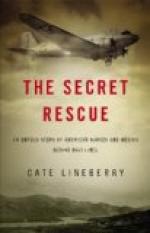“I can’t see what you were thinking about,” went on the other irritably, “to go on playing after you’d bust things up again.”
“No, sir—that is, I’m sure I don’t know.” Neil’s tone was very meek, but the doctor nevertheless looked at him suspiciously.
“Humph! Much you care, I guess. But, just the same, my fine fellow, it’ll be Christmas before you have the use of that arm again. That’ll give you time to see what an idiot you were.”
“Thank you, sir.”
The doctor smiled in spite of himself and looked away.
[Illustration: Erskine vs. Robinson—The Second Half.]
“Doesn’t seem to have interfered with your appetite, anyhow,” he said, glancing at the well-nigh empty tray on the chair.
“No, sir; I—I tried not to eat much, but I was terribly hungry, Doc.”
“Oh, I guess you’ll do.” He picked up his hat; then he faced the couch again and its occupant. “The trouble with you chaps,” he said severely, “is that as long as you’ve managed to get a silly old leather wind-bag over a fool streak of lime you think it doesn’t matter how much you’ve broke yourselves to pieces.”
“Yes, it’s very thoughtless of us,” murmured Neil with deep contriteness.
“Humph!” growled the doctor. “See you in the morning.”
When the door had closed Neil reached toward the tray and with much difficulty buttered a piece of Graham bread, almost the only edible thing left. Then he settled back against the pillows, not without several grimaces as the injured shoulder was moved, and contentedly ate it. He was very well satisfied. To be sure, a month of invalidism was not a pleasing prospect, but things might have been worse. And the end paid for all. Robinson had departed with trailing banners; the coaches and the whole college were happy; Paul was happy; Sydney was happy; he was happy himself. Certainly the bally shoulder—ouch!—hurt at times; but, then one can’t have everything one wants. His meditations were interrupted by voices and footsteps outside the front door. He bolted the last morsel of bread and awaited the callers.
These proved to be Paul and Sydney and—Neil stared—Tom Cowan.
“Rah-rah-rah!” shouted Paul, slamming the door. “How are they coming, chum? Here’s Burr and Cowan to make polite injuries after your inquiries—I mean inquiries—well, you know what I mean. Tom’s been saying all sorts of nice things about your playing, and I think he’d like to shake hands with the foot that kicked that goal.”
Neil laughed and put out his hand. Cowan, grinning, took it.
“It was fine, Fletcher,” he said with genuine enthusiasm. “And, some way, I knew when I saw you drop back that you were going to put it over. I’d have bet a hundred dollars on it!”
“Thunder, you were more confident than I was!” Neil laughed. “I wouldn’t have bet more than thirty cents. Well, Board of Strategy, how did you like the game?”




